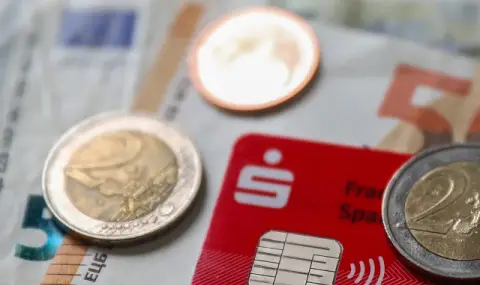In Eastern Europe are strongly reserved towards the introduction of the euro. Only Bulgaria actively strives to introduce it. But where they obstruct the pan-European currency, it will come in through the back door, FAC warns.
Tourists and travelers in a total of 20 European countries no longer exchange money or calculate prices from one currency to another because they are part of the Eurozone. Another six are still outside it, but have committed to introducing the common European currency, notes the "Frankfurter Allgemeine Zeitung" (FAC). These are Sweden, Poland, the Czech Republic, Hungary, Romania and Bulgaria. The Danes have negotiated an exception for them.
Only Bulgaria is working actively to introduce the euro
But none of these countries, with the exception of Bulgaria, shows interest in quickly introducing the euro, commented FAC. According to the latest reports of the European Central Bank, countries do not meet most of the criteria for joining the Eurozone - inflation, deficit, debt, currency stability, convergence of long-term interest rates. 10 years ago, their performance was much better, but then, and now, there is a lack of enthusiasm among citizens to join.
The German publication notes that despite the oft-cited benefits of joining the single currency - as a magnet for investors, a vehicle for integration and a symbol of stability - most Eastern European governments are so far saying: “Euro? No thanks!“ Why is Eastern Europe different? What is the reason?
Why don't Eastern European countries want the euro?
The reasons vary from country to country. In Hungary, which is suffering from the blows of inflation, 76% of citizens are in favor of introducing the euro, but this contradicts the anti-European course of the government.
In the Czech Republic, the government would likely agree with the president and businesses pushing for entry into the eurozone if 51% of citizens were not against it. The reasons for this are many - among them are the fear of political dominance by Brussels, the responsibility for financial and political mistakes of the other members of the euro area, the pride of the Czech krona, as well as the fear of increasing inflation when changing the currency, although such an effect does not is reliably proven.
Political polarization in Poland affects this topic as well. There, 53% of citizens are critical of the introduction of the euro.
The Bulgarian lev is part of the Exchange Rate Mechanism ERM II, and the country fulfills most of the criteria for joining, notes the FAC, but the inability of the parties in Sofia to form a stable government makes the achievement of this goal further away
Romania is a more special case: there, support for the introduction of the euro is widespread - both in the government and among three quarters of the population. However, the country's budget deficit is becoming an obstacle. Almost half of the loans granted to non-banking institutions in Hungary and the Czech Republic are in euros, says the author of the FAC material, Andreas Mim. Since the big banks that broker these loans are subject to supervision by the EU, it already has an indirect but profound impact on the financial and economic policy of even countries outside the Eurozone.
The spread of the euro cannot be stopped
Reservation towards the euro and the fact that many countries hold on to their national currency does not stop the quiet process of Europeanization in the countries of Eastern and South-Eastern Europe, as well as in the countries of the Western Balkans, in some of which the euro already plays a de facto role the role of national currency, explains FAC. In these countries, companies often trade with each other in euros, cross-border payments of international concerns are also made in the common European currency.
In Montenegro, for example, the euro plays the role of national currency, although the country is not in the EU. In 1999, the state abandoned the dinar due to high inflation and replaced it with the German mark. In 2002, when the common European currency came into force, Montenegro de facto adopted the euro. The European Central Bank has repeatedly shared its displeasure with Podgorica's unilateral use of the euro, but it can do nothing to stop it, notes “Wirtschaftsvohe“.
The spread of the euro as a pan-European currency cannot be stopped, FAC summarizes. And where governments prevent it from being admitted through the front doors, sooner or later it will enter through the back door.
